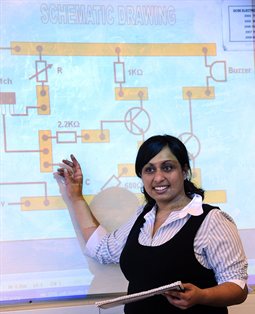Overview
It's a good idea to get some school experience to help you make the important decision about the subject and age group you want to teach. You’ll then need to start thinking about your written application - this is your chance to make yourself stand out to schools or universities.
Applications for postgraduate primary and secondary teaching courses are made through the DfE Apply System. The Department for Education regulations specify that applications and interviews must be processed within 40 working days of being submitted, so please ensure you are available as much as possible after you have applied.
Our making your application advice is taken from the Department for Education's Get into Teaching website.
Personal statement
When you submit your application via the DfE Apply System, you’ll need to write a personal statement. The personal statement consists of two sections:
Why you want to teach (up to 600 words)
You can include:
- your interest in the subject or age group
- the demands and rewards of teaching
- the personal qualities that would make you a good teacher
- how you could contribute to a school outside of the classroom
- any past experience working with children or young people, and what you learnt
- your thoughts on welfare and education
Your suitability to teach a subject or age group (up to 400 words)
This section asks for detailed evidence for the knowledge and interest you bring to the subject(s) you’d like to teach.
Evidence can include:
- the subject of your undergraduate degree
- modules you studied as part of your degree
- postgraduate degrees (for example, a Masters or PhD)
- your A level subjects
- expertise you’ve gained at work
Work and unpaid experience
On the form you should add your work experience but also any unpaid experience such as working with children or volunteering.
When you add an example, you can provide an accompanying description of up to 150 words, detailing what was involved. In this section you should also include any reasons for leaving jobs, as well as consequent gaps in employment.
Make sure you take the time to give a clear outline of your experiences and when they happened. You can also highlight any skills from previous work that could be applicable to teaching, although if the character limit restricts you then you may choose to include this in the personal statement section.
If you’re applying for the School Direct Training Programme (salaried) – which is mainly aimed at career changers with at least three years’ work experience – this part of the form can be important for demonstrating your eligibility.
Some schools may accept applications from high-quality graduates with fewer than three years’ experience on to the salaried programme, especially in maths, physics, chemistry, languages and computing. You can check with individual training providers about this before applying.

References
The DfE Apply form asks you to provide two referees, without which your application cannot progress.
Unlike a standard work reference, your references for teacher training need to be named individuals rather than (for example) a human resources team or academic department.
You will need to choose one principal referee and one secondary referee – normally one of the referees will produce an academic reference and the other a professional reference.
They’ll have 2 weeks to respond, so it’s worth contacting them before you apply so they understand why you’re applying and what they’ll be asked to do.
Further advice on references can be found at the Get into Teaching website.